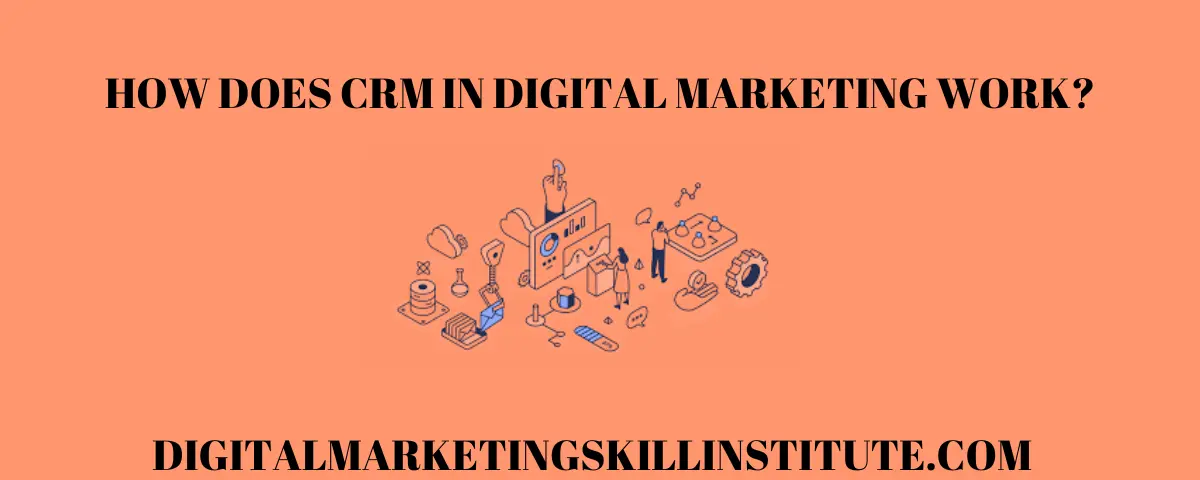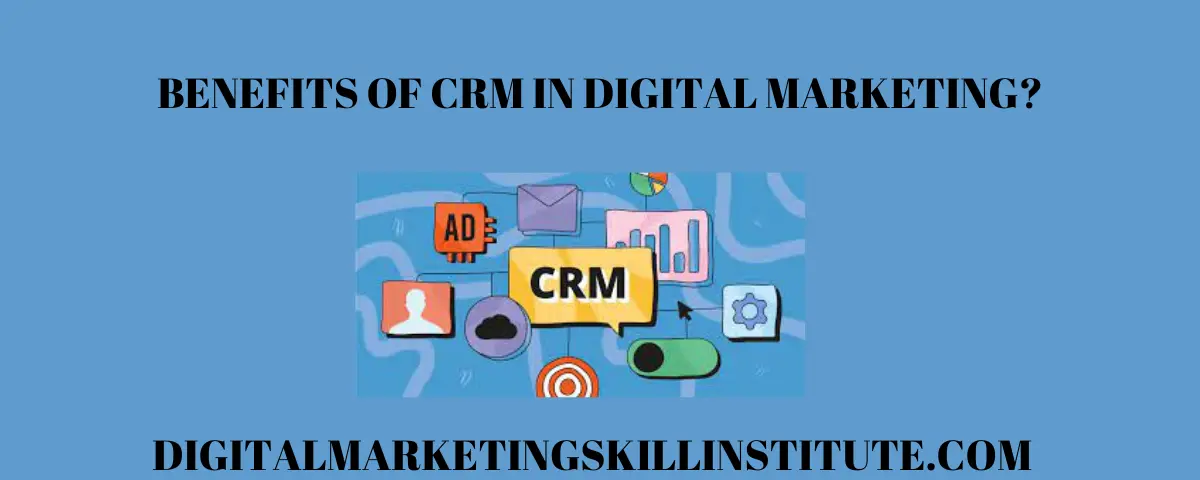CRM, which stands for customer relationship management, is a digital marketing tool that helps businesses manage their customer relationships and their data.
With marketing growing and getting bigger, businesses and organizations thought it wise to keep relationships with the real reasons behind why their brands became a success: their customers. They realize that keeping these relationships is what will help their brands in the future.
What is CRM in digital marketing?
CRM in digital marketing refers to the practices, strategies, and technologies used by businesses to manage and analyze their interactions and data related to customers and prospects.
A CRM is like a container that has all the information about your past and present customers. It stores data like contact information, sales history, purchasing patterns, and even preferences.
CRM in digital marketing is more like a digital cabinet for customer data. With CRM, outreaches can be planned, performance can be evaluated, and most importantly, customer interactions can be managed effectively.
Why do customers use CRM systems?
Get 50% Discount to Master ALL Aspects of Digital Marketing That Can Earn You $2,500 - $5,000 a month (Even if you are a complete beginner!)
Our students that intentionally implement what they learn from our digital marketing course make back the entire course fee within a single month or more after completing our course because our course gives them many income generating options with unlimited earning potential with no age or location barrier. The best part is no technical skills are required.
An opportunity to change your lifestyle and make money working from anywhere in the world. The results our students get from our digital marketing course prove this could be applied to any market or country and that it is designed for any skill level and work background.
*By signing up, you agree to our privacy policy and terms of service.
Companies utilize CRM systems in digital marketing to streamline customer interactions and boost overall marketing performance. CRM solutions enable firms to centralize and organize customer data, simplifying the tracking and management of customer relationships.
A CRM system allows businesses to tailor their marketing efforts by providing targeted messages and offers to specific parts of their client base. This boosts engagement and conversion rates since clients are more likely to respond positively to individualized messaging.
Also, CRM systems allow businesses to automate a variety of marketing operations, including email campaigns, lead creation, and customer segmentation. This saves time and resources, allowing marketing teams to concentrate on strategic goals and creative projects.
How does CRM work in digital marketing?
CRM works by assisting businesses to manage and nurture their relationships with their customers. It allows for communication through social media platforms, emails, and other digital channels, all in the bid to build and maintain strong relationships with their customers. The CRM platform works with the following steps:
1. Configuring the platform
Begin by installing the CRM software on your system or through a cloud-based platform. Then, tailor the CRM’s settings and capabilities to your own business needs and goals. And tailor the CRM interface, fields, and workflows to your individual needs and operations.
2. Collecting customer data
Collect client information directly using online forms, surveys, or feedback systems. Ensure you use a variety of data collection tools, including website monitoring, social media interactions, and purchase history, to get comprehensive customer information.
3. Entering data into the CRM
Enter all obtained customer data into the CRM system with correctness and completeness, then sort consumer data into categories and segments for simple retrieval and analysis.
4. Automating processes
Use email marketing automation to deliver personalized messages at scale, based on consumer interactions and preferences. With CRM automation, you may segment clients based on demographics, activity, or engagement level, allowing for more targeted marketing efforts. Automate lead generation operations, such as lead scoring and nurturing, to improve sales pipeline efficiency and find prospects.
5. Analyzing data
Analyze consumer data to get useful information about purchase patterns, preferences, and behaviors. Using the CRM, create reports and dashboards to measure critical data like customer acquisition expenses, conversion rates, and client lifetime value.
6. Improving relationships
Use CRM insights to provide personalized recommendations, offers, and assistance. Encourage customer engagement by communicating with them on time, following up, and reaching out proactively. Track client feedback and satisfaction levels to find areas for improvement and improve the entire customer experience.
Types of CRM in digital marketing
1. Operational CRM
If there’s one thing this system is good at, it’s sales. It does this by trying to streamline the way the business or company interacts with customers. It focuses on improving customer acquisition and retention. When the company gets new leads, it naturally converts them into customers. One key function of operational CRM is its marketing automation, which allows it to target customers via email and text. These customers are usually specific. It also uses sales automation to communicate with customers at specific points in their sales process.
2. Analytical CRM
This CRM system allows you to understand how your customers are going through the sales funnel. It is suitable for all businesses and it provides insights into how customers interact with the business. Analytical CRM performance reports. This allows the marketer to see the strengths of the team members. It also shows the history and customer satisfaction. With analytical CRM, you can take, store, and analyze customer data, which will provide information on how these customers interact with your business.
3. Collaborative CRM
In collaborative CRM, the focus is on facilitating communication between different departments in a company. For instance, the sales and marketing department. Collaborative CRM is made possible with collaboration tools like shared calendars, document sharing and even project management tools. These tools allow the team members to work effectively by sharing information and communicating.
4. Strategic CRM
This ensures that the customer’s needs beliefs and preferences are aligned with the business strategy. This leads to long-term growth and profitability. Strategic CRM emphasizes creating customer-centered strategies that can differentiate a business from its competitors. Segmentation is a key part of strategic CRM because it allows businesses to tailor their marketing strategy to each segment, which can increase engagement and conversion. It also focuses on relationship management because it leads to personal loyalty, drives sales, and increases customer lifetime value.
Benefits of CRM in digital marketing
1. Saves time and costs
CRM saves time and cost. Time is safe because there won’t be any need to manually input this information and encourage the employee to do more tasks that can boost the efficiency of the company. It will also prevent the loss of data and this will help save marketing costs because when this information is readily available, it is easier to target the right customers.
2. Improved customer relationships
CRM makes it easier to improve customer relationships. It does this in so many ways. One of them is that it helps you respond to customers on time and provide them with a beautiful, personalized experience. And increases customer satisfaction. It also allows for effective communication with customers Tailoring the conversations to them alone.
3. Increased efficiency
CRM streamlines processes by automating tasks and centralizing data so that more is done with less effort and time. Some of these processes include manually entering this data, email communication, and lead management. However, when CRM systems take on this task, employees can focus on other things that can promote the company.
4. Increased revenue
CRM (Customer Relationship Management) solutions help firms increase income by enhancing customer engagement, streamlining sales processes, and optimizing marketing efforts.
It also helps firms develop and maintain deeper customer relationships by offering personalized experiences and timely, relevant communications. CRM systems, by centralizing customer data and interactions, enable organizations to better understand their customers, anticipate their requirements, and adjust their products or services accordingly.
This tailored strategy not only improves client pleasure and loyalty, but it also leads to improved conversion rates and repeat sales, resulting in increased income.
5. Scalability
CRM (customer relationship management) solutions provide firms with the necessary scalability to handle expansion, expand operations, and successfully respond to changing market conditions.
To begin, CRM solutions provide a single platform for managing customer data, interactions, and relationships, allowing firms to scale operations without sacrificing efficiency or effectiveness. CRM systems can handle growing volumes of data, enabling continuous management and analysis of customer information at scale.
Challenges of CRM in digital marketing
Even the best systems have their downsides, and CRM is no exception. Even with the numerous benefits, it has some challenges that, as a marketer, you might want to be aware of. Some of them include:
Data integration
Sometimes CRM systems find it difficult to integrate data from sources like websites and social media. This can be very complex and time-consuming. To solve this problem as a marketer, you should implement data integration tools so that time integration can be seamless and easy.
Data accuracy
CRM heavily relies on accurate data to function. What this means is that any errors or disruptions in the data can impact the results produced. This will, in turn, not yield good results for the company. CRM works in a garbage-in, garbage-out setting, so for that to be avoided, ensure that the correct data is entered into the CRM system.
User engagement
Sometimes it can be difficult to get users to adopt and engage with the CRM system. It can even be more difficult if they perceive it as tiring or time consuming. This can also be very frustrating for the marketer. When this happens, know what CRM is and how it benefits them. They should also provide training and support to users so they know how to engage with the CRM systems.
Customer expectation
Meeting customer expectations can also prove difficult because it requires advanced resources to ensure that the interactions are personalized. Today, customer’s expectations have also increased. Customers expect businesses to know their needs and deliver personalized experiences.
So to conquer this challenge, find a way to utilize the wealth of data they have gotten. This will help them know more about their customers preferences, interests, and purchasing patterns so they can target and personalize marketing messages and experiences.
Privacy and security
This is another paramount challenge that CRM systems face in digital marketing. Sometimes it is difficult for CRM systems to comply with all the applicable data privacy regulations. Also, since they store a large amount of sensitive customer information, there is a tendency for these systems to experience security breaches, unauthorized access, and data leaks.
To address these issues, CRM systems must put in place data encryptions to prevent unauthorized access and data breaches. What encryption does is scramble data so that only those with the key can accept it. Marketers should also ensure that only authorized users have access to sensitive data. In addition to these two, a regular security audit should be performed to identify potential threats and weaknesses in the CRM system.
Conclusion
CRM has now become integrated with digital marketing. Knowing how to utilize it in a technologically advanced world would prove very profitable to business owners. CRM has been shown to assist businesses not only in improving their relationship with their customers but also in improving opportunities and increasing their satisfaction. CRM is a key component of a business marketing strategy.
To learn more about CRM and its role in digital marketing, why not attend our next digital marketing training to get started and understand the fundamentals of online marketing and other marketing niches?
FAQS
Why does your team need a CRM?
A CRM (customer relationship management) system is required for your team to centralize customer data, increase communication and cooperation, streamline operations, provide better customer service, and make data-driven choices. It acts as a centralized store for consumer data, allowing your team to obtain insights, provide personalized experiences, and track interactions more effectively.
A CRM system enables your staff to automate regular processes, respond swiftly to customer requests, and provide superior service. Furthermore, CRM systems offer data-driven decision-making by delivering useful information about consumer behavior and preferences.
Cost of CRM
The cost of a CRM (Customer Relationship Management) system can vary greatly based on requirements such as business size, CRM solution complexity, user count, and features and services incorporated.
Basic CRM: Some CRM providers give basic CRM systems with restricted functionality for free or a cheap monthly membership fee per user. These simple CRM systems usually contain essential features like contact management, lead tracking, and basic reporting.
Mid-range CRM: Mid-range CRM solutions, which include more extensive features and capabilities, often cost between $25 and $100 per user each month. These CRM systems may contain extra functions such as sales automation, marketing automation, customer service management, and more robust analytics.
Enterprise CRM: Enterprise-grade CRM solutions, meant for larger enterprises with complicated demands and high user counts, can cost between $100 and several hundred dollars per user each month. These CRM systems include comprehensive customization possibilities, advanced integration capabilities, and enterprise-grade security and scalability. An example of this is Hubspot.
Custom CRM: For firms with specific specifications or particular industry needs, custom CRM solutions may be required. The cost of a custom CRM solution varies greatly depending on development time, complexity, and ongoing maintenance and support.
How to get started with CRM
In starting with CRM, some key practices must be strictly adhered to. This is to ensure the productivity and growth of the business.
Some of the practices include:
Define your goals: Defining your goals before testing a CRM will ensure that the correct system that matches the organization’s needs and goals is selected.
Select the right platform: Selecting the right platform still depends on knowing what your business goal is. When your goal is certain, selecting the right platform that matches your goal is what comes next. When doing this, it is imperative to consider things like ease of use and scalability.
Have a good infrastructure: A successful CRM needs a good infrastructure. A good infrastructure allows CRM to be effective. A good infrastructure includes workflow automation and control measures.
Ensure your team is trained: CRM needs to be used by a team that is properly trained on how to use it to prevent data errors and ensure that the process is a success. The sales, marketing, and customer service teams should be well trained.
Measure performance: The performance of the CRM system needs to be measured to know if the outcome is successful. To measure the performance, you would need an ROI analysis and KPI tracking.
More Resources
Digital marketing tools in Nigeria: 15 digital marketing tools you need for your business growth





